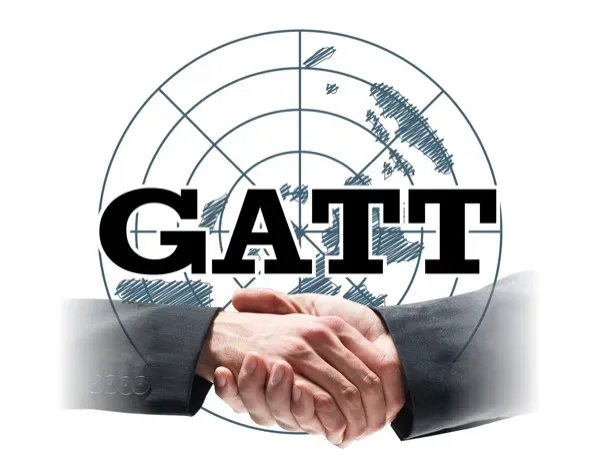
Some people seem to think that, The General Agreement on Trade and Tariffs will help the EU and Britain finally find a postive way forward that will not damage European citizens and could lead to an economically stable Europe.
This is indeed a useful piece of legislation that does provide a safety net for Britain upon exit. However, this has only become necessary in light of the UK Government weakness in negotiation and complete failure to plan for what the majority of people saw as the most likely scenario.
What is this agreement?
The General Agreement on Trade and Tariffs was created in 1947. It was amended several times with significant amendments in 1980 and 1994 which have helped to keep it relevant to WTO members. The GATT organisation pre dates the WTO. Its members were referred to as signatories. In 1994 there were 128 signatories to the GATT agreement and these signatories then became members of the then newly formed World Trade Organisation in 1995 which replaced it. This agreement is still in force and binding as it was adopted by the WTO upon formation. The amendment just prior to migration into the WTO actually helped to clarify the interpretation of the agreement for clarity between members. However, it is worth noting that today, the WTO has 168 member nations. Meaning that, the GATT agreement was never signed by members that signed up to the WTO terms after formation in 1995.
However, it does cover the EU countries and as it was adopted by the WTO and never repealled or cancelled in any form it still underpins the WTO rules.
The relevance here is that the EU Members are signed up to this agreement and the agreement, and very specifically article 24 are particularly focussed on the increasing number of free trade areas appearing around the world. The ambition of these organisations is to fascilitate and increase trade worldwide. That requires measures to prevent situations which may decrease trade. Free trade areas have the potential to do just that, creating closed protectionist markets that could create prejudicial and highly politicized markets to the detriment of substainable trade growth world wide.
If one looks at the 1994 amendment in particular, it very much appears to have been written to clarify the relationship between organisations like the EU and those of their bordering territories in particular. A situation that could create cause a great many issues if left unregulated.
On the surface of it. Article 24 may provide a blueprint to mitigate the concerns of many of those who are peddling a fear driven narrative based on a false understanding or representation of the facts.
This is tried and tested legislation that could be used in a situation which is unprecedented. Therefore Britain will need to be providing leadership in establishing how such a scenario is managed within these terms. When there is uncertainty, it is reassuring to find that a blueprint exists that establishes some foundational rules governing a worst case scenario. It is disappointing that the government were not able to use these fallback position and the negotiation process to create a ‘Canada’ style deal in advance where the alternative was a cushioned no deal exit based upon these terms. What business only plans for ideal results without putting in place tangible contingency for adverse conditions?
It steps outside of the chosen narrative created by politically led decision making on both sides of the House of Commons and of those on both sides of the ‘LEAVE or Remain’ camp by potentially allowing a managed exit from the EU trade environment which if necessary may the intervention of an independant appointed body without political bias and with a pure trade focus whose binding recommendations will, for the first time, put defined structure to a no deal exit.
Indeed, the clue is in the objective of Article 24 of the agreement itself as it exists for precisely this purpose: Territorial Application — Frontier Traffic — Customs Unions and Free-trade Areas
Looking in more detail at some of the clarification contained within the last amendment to this article, made in 1994, the Article confirmed the intent and obligation of membersd further as we see in this text from the agreement:
Members,
Having regard to the provisions of Article XXIV of GATT 1994;
Recognizing that customs unions and free trade areas have greatly increased in number and importance since the establishment of GATT 1947 and today cover a significant proportion of world trade;
Recognizing the contribution to the expansion of world trade that may be made by closer integration between the economies of the parties to such agreements;
Recognizing also that such contribution is increased if the elimination between the constituent territories of duties and other restrictive regulations of commerce extends to all trade, and diminished if any major sector of trade is excluded;
Reaffirming that the purpose of such agreements should be to facilitate trade between the constituent territories and not to raise barriers to the trade of other Members with such territories; and that in their formation or enlargement the parties to them should to the greatest possible extent avoid creating adverse effects on the trade of other Members;
Convinced also of the need to reinforce the effectiveness of the role of the Council for Trade in Goods in reviewing agreements notified under Article XXIV, by clarifying the criteria and procedures for the assessment of new or enlarged agreements, and improving the transparency of all Article XXIV agreements;
Recognizing the need for a common understanding of the obligations of Members under paragraph 12 of Article XXIV;
Hereby agree as follows:
Customs unions, free-trade areas, and interim agreements leading to the formation of a customs union or free-trade area, to be consistent with Article XXIV, must satisfy, inter alia, the provisions of paragraphs 5, 6, 7 and 8 of that Article
Under section 12.
Each Member undertakes to accord sympathetic consideration to and afford adequate opportunity for consultation regarding any representations made by another Member concerning measures affecting the operation of GATT 1994 taken within the territory of the former.
What might this mean for the EU / Brexit arrangement.
Looking at it in terms of how it may break the deadlock: there appears to be a means to negate the need for an Irish backstop. It also mitigates much of the need for Theresa May’s deal by closing the GAP between ‘No Deal’ and Theresa May’s terrible deal. In short, it appears to create a framework for a more orderly exit that doesn’t allow a trade block to disrupt trade for ideological reasons and is already in effect and signed by all members. Making it unilateral or providing a more independant mechanism to resolve a dispute if agreement cannot be reached.
It seems to provide a mechanism, such that ‘punishment’ terms cannot be imposed upon the UK for ideological purposes.
However, the problem is some possible gaps in timing. Where goodwill does not exist, or rather, where the EU wish to proceed for as long as possiible to continue uncertainty across Europe it means that we have a potential gap. A solution could be being put in place around the spirit of this agreement today which would come into effect on the day Britain leaves. Which certainly seems to be the case.
However, what Article 24 does offer, is the means to limit the damage caused by poor planning within the UK and the inability of the ‘House of Commons’ in general to carry out their obligation to the British people.
It would appear that, this agreement can only come into force after Britain officially leaves the EU. But that does not mean that capability, infrastructure and agreement cannot be focussed on it as a worst case scenario that many people will find, is not bad at all for Britain if we can elicit some competence and confidence from the UK government.
So why didnt the competent (and I use that term sparingly) authorities, mention this and table an amendment before parliament concerning article 24?
Here is the 39 billion Euro question. Could it be because the EU want 39 Billion Euros and the unwillingness of the UK Prime Minister to focus on carrying out the mandate she was given rather than sticking her fingers in her eyes and whistling the EU anthem while pretending that LEAVE, did not mean, STAY, HALF IN or worse terms than already existed. Rather than work on leaving, the UK Government has spent all this time in trying to find ways to sell remain, under another name.
If the UK had been working harder from the perspective of a nation state, rather than in collusion with the counterparty, perhaps this little gem may have cropped up somewhat earlier. The fact that there hasnt been more interest in government and in the mainstream press should sound alarm bells in any free thinking mind.
Perhaps instead of the massive media campaign by vested interests we can now move forward in a more reasonable (for the members of the EU) and sensible fashion? Knowing that the worst case scenario which has been peddled in the media is simply fake news.
